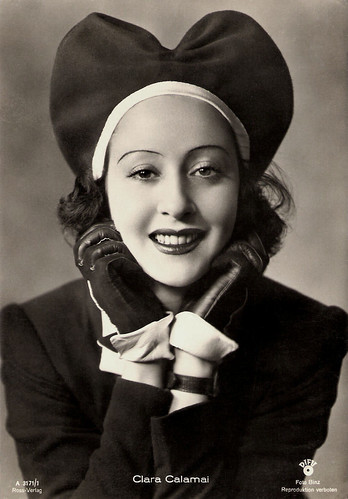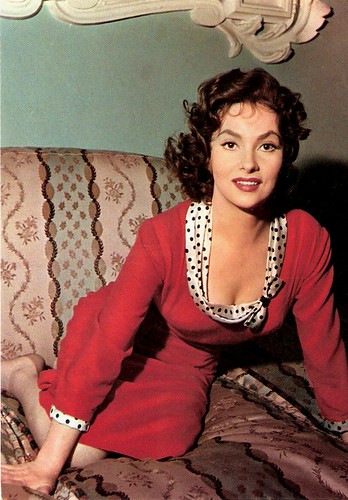Carlo Romano (1908-1975) was an Italian actor in film, vaudeville, radio and television. He was also a highly active voice actor, and was the Italian voice of Fernandel in all the Don Camillo comedies.

Italian photo card by A. Scarmiglia Editore (Aser), Roma (Rome), no. 87. Photo: Aser.
Carlo Romano was born in Livorno in 1908. He was the son of actress Dina Romano and the younger brother of Felice Romano, who was an actor as well. He started at the Teatro Minimo in Trieste when he was only five.
In 1929 Romano entered the Compagnia Talli-Capodaglio, and later he was active in vaudeville. Because of his young age and his style, which was theatrical and personal, expressing sympathy and warmth, he was nicknamed Carletto (little Carlo), a name that stuck on him. In 1933 Romano married actress Jone Bolghero but the couple divorced later.
In the cinema Romano started in 1934 with an uncredited part as a taxi driver in La signora di tutti/Everybody's Woman (Max Ophüls, 1934) starring Isa Miranda. After years of small parts, his roles slowly became bigger towards the end of the decade.
He played mostly in comedies by Guido Brignone, and Mario Bonnard. In dramas he was still often the comical sidekick. Romano played the protagonist of the comedies Il socio invisibile/The invisible partner (Roberto Roberti, 1939) co-starring Clara Calamai, and Un marito per il mese di aprile/A husband for the month of April (Giorgio Simonelli, 1941).
Between 1939 and 1943 he played in some 35 films. From these very active years, Romano is best remembered for Cavalleria rusticana (Amleto Palermi, 1939) - in which his mother also performed, for Quattro passi fra le nuvole/Four Steps in the Clouds (Alessandro Blasetti, 1942) in which he was the reckless bus driver Antonio, and for the Beniamino Gigli vehicle I pagliacci/Laugh Pagliacci (Giuseppe Fatigati, 1942) in which Romano played composer Ruggero Leoncavallo.

Clara Calamai. German postcard by Ross Verlag, no. A 3171/1, 1941-1944. Photo: Binz / DIFU.

Beniamino Gigli. Italian postcard. Photo: Nova Film.
In the postwar era Carlo Romano would play in some 55 films more. Highlights are Campane a martello/Bells to hammer (Luigi Zampa, 1949) with Gina Lollobrigida, Domani è troppo tardi/Tomorrow Is Too Late (Léonide Péguy, 1950) starring Pier Angeli, Il cardinale Lambertini/Cardinal Lambertini (Giorgio Pastina, 1954) starring Gino Cervi, and the Aldo Fabrizi drama Accadde al penitenziario/It happened at the penitentiary (Giorgio Bianchi, 1955).
One of Romano’s best parts was as the lawyer Enzo La Rosa in the tragicomedy Luci del varietà/Variety Lights (Alberto Lattuada, Federico Fellini, 1950), about a young golddigger (Carla Del Poggio), who uses the head of a second-rate theatrical group (Peppino de Filippo) to launch her career.
With Alberto Lattuada, Romano continued to work in La spiaggia/Riviera, and with Federico Fellini in I vitelloni, both from 1953.
I Vitelloni follows the lives of five young vitelloni, or layabouts, who while away their listless days in their small seaside village. Romano plays Michele Curti, the owner of a shop in religious articles. He takes on one of the vitelloni, skirt chaser Fausto (Franco Fabrizi) whose father-in-law is his friend. Curti fires him when Fausto tries to seduce Curti’s wife (Lida Baarova) during the carnival. Later on Fausto steals a statue from Curti and tries to sell it to a monk. A hit in Italy upon its release, I Vitelloni secured Fellini's reputation as an up-and-coming talent, and it was his first international success.
Lattuada's La spiaggia was one of the first films shot in Ferraniacolor. It was a drama about a woman (Martine Carol) who is celebrated and then rejected by the local high society of a fashionable seaside village, when it is discovered she was a prostitute.

Gina Lollobrigida. Italian postcard by Rotalcolor, no. 17.

Martine Carol. German postcard by Universum-Film Aktiengesellschaft, Berlin-Tempelhof, no. CK-2. Retail price: 30 Pfg. Photo: Gérard Décaux / Ufa.
In addition to acting, Carlo Romano was even more active in dubbing. During the 1930s, 1940s and 1950s, he gave his voice to numerous foreign and Italian actors, enriching them with caricature-like airs and when necessary with dialects. Among those whose Italian voice he was, were Fred Astaire, James Cagney, Bob Hope, Jerry Lewis, Fernandel (Romano was his voice in the Italian versions of all the Don Camillo films), Lou Costello (known in Italy as Pinotto) and Peter Lorre.
In later decades he was the Italian voice of Eli Wallach, Rod Steiger and Jason Robards in their Spaghetti Westerns.
For Disney he dubbed Jiminy Cricket in Pinocchio (Hamilton Luske, Ben Sharpsteen, 1940), the Mad Hatter in Alice in Wonderland (Clyde Geronimi, Wilfred Jackson, Hamilton Luske, 1951), the Secretary Bird in Bedknobs and Broomsticks (Robert Stevenson, 1971) and the Sheriff of Nottingham in Robin Hood (Wolfgang Reitherman, 1973).
From the mid-1950s on, Romano also often worked for TV, and he had an even bigger career on the radio, playing in various radio dramas such as La domenica della buona gente/The Sunday of the Good People (1952), directed by Anton Giulio Majano, who also directed him in the 1953 film adaptation.
For years Romano joined the Compagnia del Teatro Comico Musicale of Radio Roma, often directed by Riccardo Mantoni.
His last films were the Spaghetti Western Lo sceriffo di Rockspring/Sheriff of Rock Springs (Mario Sabatini, 1971) with Richard Harrison, and the drama Il venditore di palloncini/The Balloon Vendor (Mario Gariazzo, 1974) with Lee J. Cobb.
Carlo Romano died in Bracciano, Italy in 1975.
Trailer La domenica della buona gente (1953). Source: DiFilm (YouTube).
Trailer I Vitelloni (1953). Source: Argent Films (YouTube).
Sources: AllMovie, Wikipedia (English and Italian) and IMDb.

Italian photo card by A. Scarmiglia Editore (Aser), Roma (Rome), no. 87. Photo: Aser.
Comical Sidekick
Carlo Romano was born in Livorno in 1908. He was the son of actress Dina Romano and the younger brother of Felice Romano, who was an actor as well. He started at the Teatro Minimo in Trieste when he was only five.
In 1929 Romano entered the Compagnia Talli-Capodaglio, and later he was active in vaudeville. Because of his young age and his style, which was theatrical and personal, expressing sympathy and warmth, he was nicknamed Carletto (little Carlo), a name that stuck on him. In 1933 Romano married actress Jone Bolghero but the couple divorced later.
In the cinema Romano started in 1934 with an uncredited part as a taxi driver in La signora di tutti/Everybody's Woman (Max Ophüls, 1934) starring Isa Miranda. After years of small parts, his roles slowly became bigger towards the end of the decade.
He played mostly in comedies by Guido Brignone, and Mario Bonnard. In dramas he was still often the comical sidekick. Romano played the protagonist of the comedies Il socio invisibile/The invisible partner (Roberto Roberti, 1939) co-starring Clara Calamai, and Un marito per il mese di aprile/A husband for the month of April (Giorgio Simonelli, 1941).
Between 1939 and 1943 he played in some 35 films. From these very active years, Romano is best remembered for Cavalleria rusticana (Amleto Palermi, 1939) - in which his mother also performed, for Quattro passi fra le nuvole/Four Steps in the Clouds (Alessandro Blasetti, 1942) in which he was the reckless bus driver Antonio, and for the Beniamino Gigli vehicle I pagliacci/Laugh Pagliacci (Giuseppe Fatigati, 1942) in which Romano played composer Ruggero Leoncavallo.

Clara Calamai. German postcard by Ross Verlag, no. A 3171/1, 1941-1944. Photo: Binz / DIFU.

Beniamino Gigli. Italian postcard. Photo: Nova Film.
Fellini
In the postwar era Carlo Romano would play in some 55 films more. Highlights are Campane a martello/Bells to hammer (Luigi Zampa, 1949) with Gina Lollobrigida, Domani è troppo tardi/Tomorrow Is Too Late (Léonide Péguy, 1950) starring Pier Angeli, Il cardinale Lambertini/Cardinal Lambertini (Giorgio Pastina, 1954) starring Gino Cervi, and the Aldo Fabrizi drama Accadde al penitenziario/It happened at the penitentiary (Giorgio Bianchi, 1955).
One of Romano’s best parts was as the lawyer Enzo La Rosa in the tragicomedy Luci del varietà/Variety Lights (Alberto Lattuada, Federico Fellini, 1950), about a young golddigger (Carla Del Poggio), who uses the head of a second-rate theatrical group (Peppino de Filippo) to launch her career.
With Alberto Lattuada, Romano continued to work in La spiaggia/Riviera, and with Federico Fellini in I vitelloni, both from 1953.
I Vitelloni follows the lives of five young vitelloni, or layabouts, who while away their listless days in their small seaside village. Romano plays Michele Curti, the owner of a shop in religious articles. He takes on one of the vitelloni, skirt chaser Fausto (Franco Fabrizi) whose father-in-law is his friend. Curti fires him when Fausto tries to seduce Curti’s wife (Lida Baarova) during the carnival. Later on Fausto steals a statue from Curti and tries to sell it to a monk. A hit in Italy upon its release, I Vitelloni secured Fellini's reputation as an up-and-coming talent, and it was his first international success.
Lattuada's La spiaggia was one of the first films shot in Ferraniacolor. It was a drama about a woman (Martine Carol) who is celebrated and then rejected by the local high society of a fashionable seaside village, when it is discovered she was a prostitute.

Gina Lollobrigida. Italian postcard by Rotalcolor, no. 17.

Martine Carol. German postcard by Universum-Film Aktiengesellschaft, Berlin-Tempelhof, no. CK-2. Retail price: 30 Pfg. Photo: Gérard Décaux / Ufa.
Caricature-like Airs and Dialects
In addition to acting, Carlo Romano was even more active in dubbing. During the 1930s, 1940s and 1950s, he gave his voice to numerous foreign and Italian actors, enriching them with caricature-like airs and when necessary with dialects. Among those whose Italian voice he was, were Fred Astaire, James Cagney, Bob Hope, Jerry Lewis, Fernandel (Romano was his voice in the Italian versions of all the Don Camillo films), Lou Costello (known in Italy as Pinotto) and Peter Lorre.
In later decades he was the Italian voice of Eli Wallach, Rod Steiger and Jason Robards in their Spaghetti Westerns.
For Disney he dubbed Jiminy Cricket in Pinocchio (Hamilton Luske, Ben Sharpsteen, 1940), the Mad Hatter in Alice in Wonderland (Clyde Geronimi, Wilfred Jackson, Hamilton Luske, 1951), the Secretary Bird in Bedknobs and Broomsticks (Robert Stevenson, 1971) and the Sheriff of Nottingham in Robin Hood (Wolfgang Reitherman, 1973).
From the mid-1950s on, Romano also often worked for TV, and he had an even bigger career on the radio, playing in various radio dramas such as La domenica della buona gente/The Sunday of the Good People (1952), directed by Anton Giulio Majano, who also directed him in the 1953 film adaptation.
For years Romano joined the Compagnia del Teatro Comico Musicale of Radio Roma, often directed by Riccardo Mantoni.
His last films were the Spaghetti Western Lo sceriffo di Rockspring/Sheriff of Rock Springs (Mario Sabatini, 1971) with Richard Harrison, and the drama Il venditore di palloncini/The Balloon Vendor (Mario Gariazzo, 1974) with Lee J. Cobb.
Carlo Romano died in Bracciano, Italy in 1975.
Trailer La domenica della buona gente (1953). Source: DiFilm (YouTube).
Trailer I Vitelloni (1953). Source: Argent Films (YouTube).
Sources: AllMovie, Wikipedia (English and Italian) and IMDb.
No comments:
Post a Comment